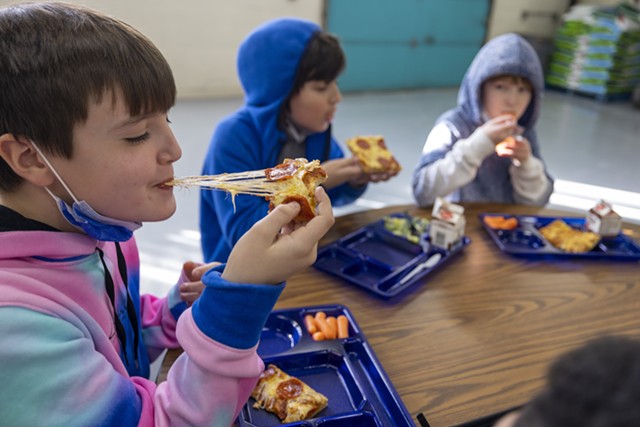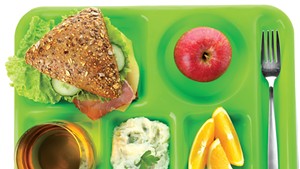
- File: James Buck
- Vermont students eating school lunch
Households with school-age kids are receiving Pandemic Electronic Benefit Transfer cards, which can be used to buy food from grocery stores or farmers markets. The cards — loaded with a minimum of $120 per child — come courtesy of the federal Families First Coronavirus Response Act, which is intended for pandemic recovery.
All children who attend "Community Eligibility Provision" schools — those that provide free meals to all students — are eligible to receive the money, according to Miranda Gray, deputy commissioner of the Department for Children and Families, which is administering the program.
Pre-pandemic, a school met the provision if 40 percent or more of its students qualified for free meals based on family income. But because of Vermont's Universal School Meals Act of 2022 — which gave free breakfast and lunch to all public-school students, regardless of household income — all public schools in Vermont, and some independent ones, meet the criteria. (This legislative session, a second universal meals bill, H.165, became law without the governor's signature. It will provide free breakfast and lunch to Vermont schoolchildren for the foreseeable future.)
Related Gov. Scott Allows Universal School Meals Bill to Become Law

Gov. Scott Allows Universal School Meals Bill to Become Law
Education
Families can use the benefit in one of three ways: to purchase groceries; to buy food at a local farmers market that accepts EBT or "Crop Cash"; or to purchase nonperishable food items to donate.
Any money not spent within 274 days will be returned to the federal government. If a family inadvertently throws out their card or needs a new one, they can call DCF's Economic Services Division at 1-800-479-6151, option 7, to request a replacement.
Anore Horton, executive director of Hunger Free Vermont, said the program works in two ways: helping families cope with rising food costs and helping the larger community recover from the pandemic. She urged Vermonters who receive the card to use it and not let the benefit go to waste.
"Those federal food dollars flow directly into our local communities, from our farmers to our general stores and grocery stores, to our neighbors who work at these businesses," Horton wrote in an email. In light of the catastrophic flooding around the state that's impacted both farmers and local businesses, "these extra food funds are even more important," she added.
Related How Pandemic Need, Federal Dollars and Local Collaboration Are Driving Better Ways to Help Food-Insecure Vermonters

How Pandemic Need, Federal Dollars and Local Collaboration Are Driving Better Ways to Help Food-Insecure Vermonters
Food + Drink Features
Horton said there's no reason to feel guilty for using the card.
"You are not taking a benefit away from anyone else or reducing anyone else's benefit by using yours," Horton said. She likened the program to federally funded, state-run summer meal sites — "which are meant to ensure that low income children can access healthy meals, but are open to all children with no applications or questions asked, as a community benefit that helps us all."
"You are not taking a benefit away from anyone else or reducing anyone else's benefit by using yours," Horton said. She likened the program to federally funded, state-run summer meal sites — "which are meant to ensure that low income children can access healthy meals, but are open to all children with no applications or questions asked, as a community benefit that helps us all."
State officials said those uncomfortable using the benefit for themselves can purchase goods and bring them to a local food pantry.










Comments
Comments are closed.
From 2014-2020, Seven Days allowed readers to comment on all stories posted on our website. While we've appreciated the suggestions and insights, right now Seven Days is prioritizing our core mission — producing high-quality, responsible local journalism — over moderating online debates between readers.
To criticize, correct or praise our reporting, please send us a letter to the editor or send us a tip. We’ll check it out and report the results.
Online comments may return when we have better tech tools for managing them. Thanks for reading.